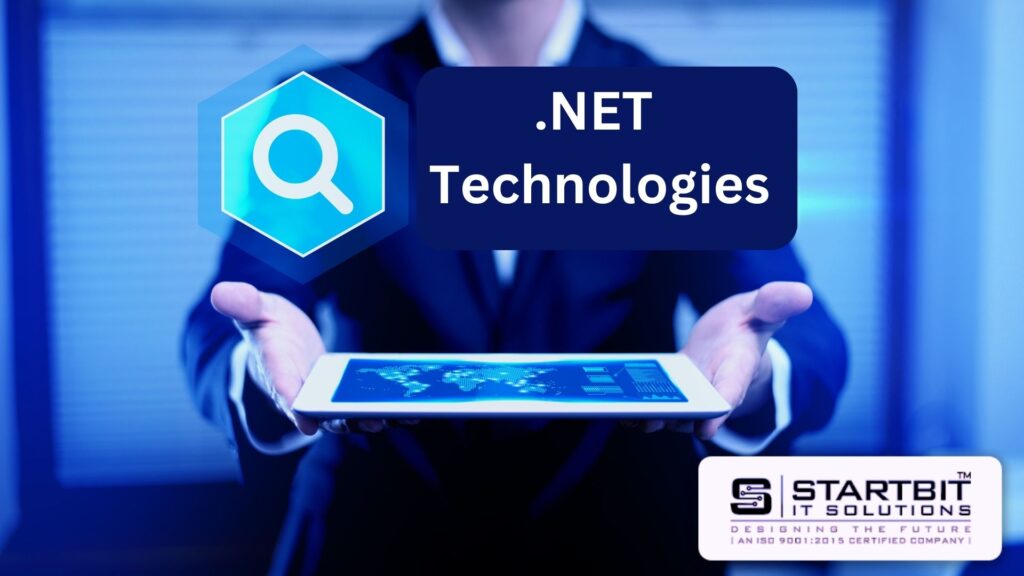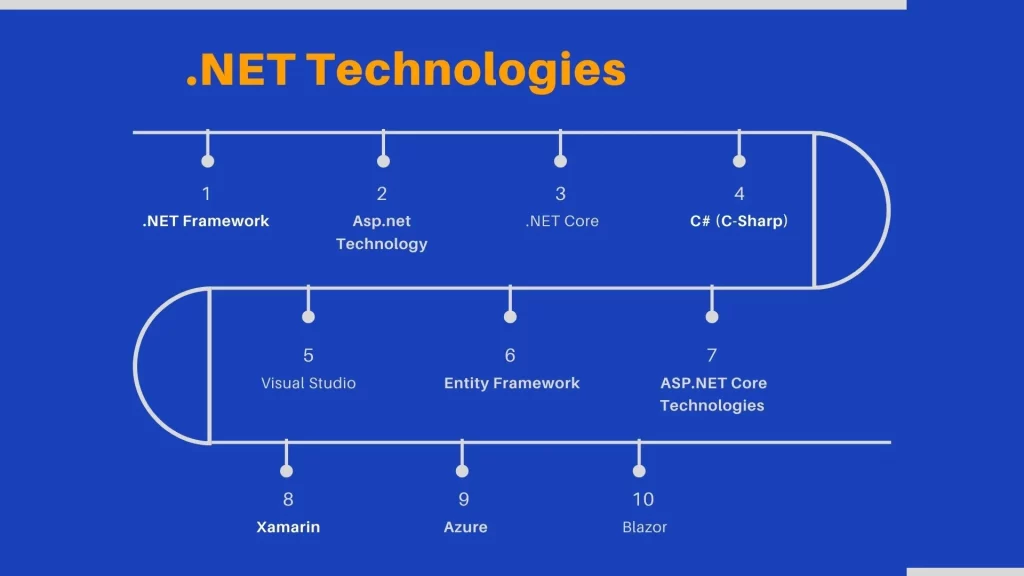Dot NET Technologies, developed by Microsoft, constitute a comprehensive framework and toolset for building diverse applications across different platforms. This ecosystem encompasses the traditional .NET Framework, ASP.NET for web development, .NET Core for cross-platform applications, and several other components that empower developers to create robust, scalable, and high-performance applications.

Dot NET Framework
The .NET Framework serves as the foundation for .NET Technologies. It comprises the Common Language Runtime (CLR) and a vast class library that provides reusable code for common programming tasks. Applications built on the .NET Framework are executed in a managed environment, offering benefits like automatic memory management and robust security features.
Common Language Runtime (CLR): Manages the execution of .NET applications, providing features such as garbage collection and Just-In-Time (JIT) compilation.
Class Library: A comprehensive set of pre-built classes and functions facilitating various programming tasks, promoting code reusability and efficiency.
Asp.net Technology
ASP.NET is a web development framework within the .NET ecosystem. It supports the Model-View-Controller (MVC) architectural pattern, enabling the development of dynamic and scalable web applications. ASP.NET applications are known for their performance, security, and ease of maintenance.
ASP.NET embraces the MVC architecture, which separates an application into three components: Model (data and business logic), View (user interface), and Controller (handles user input and manages the flow of data). This separation enhances code organization and promotes modular development.
Dot NET Core Technology
.NET Core represents a significant evolution, providing a cross-platform, open-source framework. It addresses the demand for lightweight, modular, and platform-independent solutions. Developers can use .NET Core to build applications that run seamlessly on Windows, macOS, and Linux environments.
Modularity: .NET Core allows developers to include only the necessary components, reducing the application’s footprint and improving performance.
Cross-Platform Compatibility: Applications developed with .NET Core can run on various operating systems, making it an ideal choice for cloud-based and containerized solutions.
C# (C-Sharp)
C# is the principal programming language for .NET development. It is a modern, object-oriented language that combines simplicity with powerful features. With strong typing and automatic memory management, C# streamlines the development process and enhances code reliability.
C# supports asynchronous programming, allowing developers to write responsive and scalable applications by efficiently handling concurrent operations.
Visual Studio
Visual Studio is Microsoft’s flagship integrated development environment. It supports various programming languages, including C#, VB.NET, and F#. Developers benefit from features like code completion, debugging tools, and seamless integration with .NET technologies.
Visual Studio enhances developer productivity through features like IntelliSense, which offers intelligent code suggestions, and a rich set of debugging tools that simplify the identification and resolution of issues.
Entity Framework
Entity Framework simplifies database interaction in .NET applications by providing an Object-Relational Mapping (ORM) framework. It allows developers to work with databases using high-level, object-oriented concepts rather than dealing with raw SQL queries.
Entity Framework abstracts the complexities of database interactions, enabling developers to focus on application logic rather than database intricacies.
ASP.NET Core Technologies
ASP.NET Core is a redesign of ASP.NET, optimized for building modern, cloud-based, and internet-connected applications. It offers enhanced performance, flexibility, and modularity, making it suitable for contemporary application development needs.
Cross-Platform Compatibility: Like .NET Core, ASP.NET Core supports cross-platform development, allowing applications to run on various operating systems.
Dependency Injection: ASP.NET Core incorporates a built-in dependency injection system, promoting the development of loosely coupled and maintainable code.
Xamarin
Xamarin is a framework for building cross-platform mobile applications using .NET and C#. Developers can leverage Xamarin to create native-like applications that run on iOS, Android, and Windows devices, sharing a significant portion of code across platforms.
Xamarin facilitates code sharing through a single codebase, reducing development time and effort. While providing native performance, it streamlines the maintenance of applications across different platforms.
Azure
Azure, Microsoft’s cloud computing platform, offers a wide array of services for building, deploying, and managing applications in the cloud. .NET developers can harness Azure for hosting applications, storing data, and integrating various cloud-based services.
Azure App Services: Simplifies the deployment and management of applications, supporting web apps, mobile app backends, and RESTful APIs.
Azure SQL Database: Provides a scalable and secure cloud-based database solution for .NET applications.
Blazor
Blazor is a framework that enables the development of interactive web applications using C# and .NET, eliminating the need for JavaScript in certain scenarios. Developers can build single-page applications with familiar .NET technologies, extending their capabilities to the web.
Code Reusability: With Blazor, developers can reuse existing .NET code for both client and server-side logic, promoting efficiency and reducing development time.
Integration with Existing Systems: Blazor integrates seamlessly with existing .NET applications, allowing for a gradual transition to modern web development practices.

Emerging Trends in .NET Technologies
As technology continues to advance, so does the landscape of .NET Technologies. Keep an eye on emerging trends, such as containerization, microservices architecture, and serverless computing, which are shaping the future of .NET development.
Challenges and Solutions in Dot NET Development
While .NET Technologies offer numerous benefits, developers may encounter challenges. Addressing issues like performance optimization, scalability, and staying updated with the latest features is crucial for overcoming hurdles in .NET development.
Tips for Effective DotNET Development
For developers venturing into the world of .NET, adopting best practices is essential. From code organization to efficient resource management, incorporating these tips can streamline the development process and enhance the quality of applications.
Real-world Applications of Dot NET Technologies
Explore real-world examples of successful applications built using .NET Technologies. From enterprise-level solutions to innovative startups, the versatility of the framework is showcased in various industries.
Future Prospects of .NET Technologies
The future of .NET Technologies looks promising with ongoing advancements and the community’s active involvement. Stay tuned for updates, as the framework continues to evolve, introducing new features and capabilities.
.NET Technologies offer a versatile and powerful ecosystem for developers, empowering them to create a diverse range of applications. From traditional desktop applications to modern web and mobile solutions, the .NET framework provides a unified platform for efficient and scalable development. With continuous advancements, open-source contributions, and integration with cloud services, .NET Technologies remain a key player in the ever-evolving landscape of application development.
A: .NET is a framework developed by Microsoft for building and running applications on Windows. It provides a comprehensive and consistent programming model for building applications.
A: The main components of the .NET framework include the Common Language Runtime (CLR), the .NET class library, and ASP.NET for web applications.
A: CLR is responsible for managing and executing .NET programs. It provides features such as memory management, exception handling, and security.
A: .NET supports multiple programming languages, including C#, Visual Basic, F#, and others. These languages can interoperate seamlessly within the framework.
A: C# (pronounced C-sharp) is a programming language developed by Microsoft. It is a key language for building applications on the .NET framework.
A: The .NET class library provides a set of reusable classes, types, and methods that developers can use to build applications. It simplifies development by offering pre-built functionalities.
A: ASP.NET is a web framework within the .NET ecosystem specifically designed for building web applications. It extends the .NET framework to support web development.
A: The GAC is a central repository for storing and managing shared assemblies. It allows multiple applications to use the same version of an assembly.
A: Managed code is code that runs within the Common Language Runtime (CLR). The CLR provides services like memory management and garbage collection, ensuring a higher level of control and security.
A: .NET Core is a cross-platform, open-source version of the .NET framework. It allows developers to build and run applications on Windows, macOS, and Linux.
A: .NET supports interoperability through technologies like Platform Invocation Services (PInvoke) for calling native code and Common Language Specification (CLS) for language interoperability.
A: Visual Studio is the integrated development environment (IDE) for .NET. It provides tools for designing, coding, testing, and debugging applications.
A: ASP.NET MVC is a design pattern for building scalable and maintainable web applications. It separates the application into three main components: Model, View, and Controller.
A: .NET provides the async and await keywords to simplify asynchronous programming. This allows developers to write asynchronous code that is more readable and maintainable.
A: Entity Framework is an Object-Relational Mapping (ORM) framework in .NET that simplifies database access by allowing developers to work with data in terms of objects.
A: .NET Standard is a specification that defines a set of APIs that must be available on all .NET implementations. It enables code sharing across different .NET platforms.
A: .NET provides security features such as Code Access Security (CAS), role-based security, and cryptographic services to ensure secure application development.
A: NuGet is a package manager for .NET that simplifies the process of adding, updating, and managing third-party libraries and tools in a .NET project.
A: Garbage collection is a process in which the CLR automatically manages the memory used by .NET applications by reclaiming memory occupied by objects that are no longer in use.
A: .NET Core is a modular and cross-platform framework designed for modern, cloud-based, and microservices architectures, whereas the traditional .NET framework is primarily for Windows applications.


